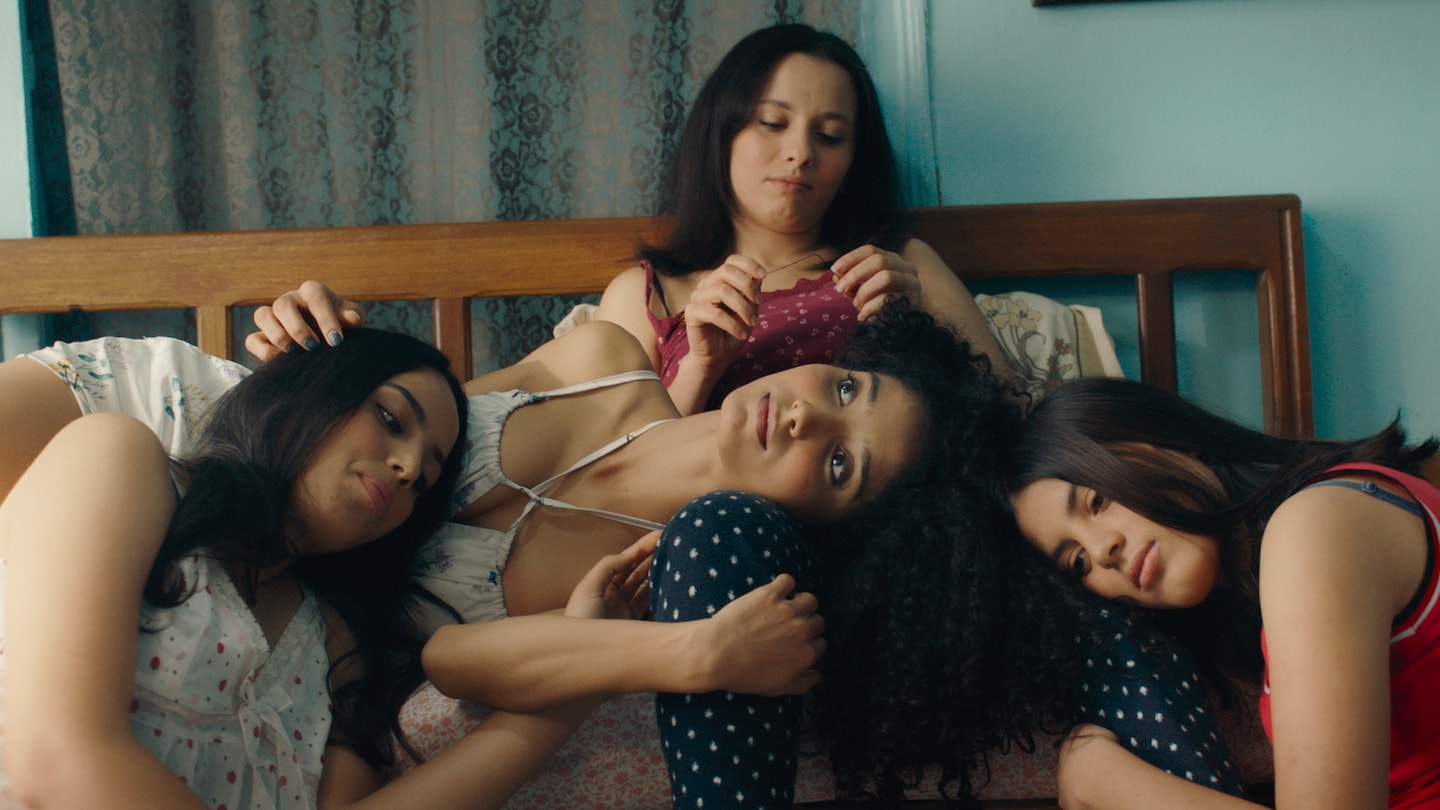
“Four Daughters” is film as family therapy and family therapy as film. This gripping and format-stretching documentary by writer and director Kaouther Ben Hania brings actors into the household of a Tunisian mother named Olfa and her two youngest daughters, Eya and Tayssir, both teenagers. The three women play themselves alongside two professional actors filling in for the girls’ missing siblings, Rahma (Nour Karoui) and Ghofrane (Ichraq Matar). A third actress (Hend Sabri) lurks on standby as an Olfa replacement when reenacting the past gets too painful.
What happened to Rahma and Ghofrane? You may have come across their names in news reports. I’d rather let “Four Daughters” unfurl their story one twist at a time. Here, on a bare-bones set that stands in for the family’s home, Hania starts her emotional exploration at the very beginning: First, the actors are put into hair and makeup. Second, the fictional substitutes are introduced to the family for inspection. As the cast assembles for its first group shot, Olfa notes that Ghofrane, not Rahma, would have chosen the seat next to hers. The actors swap places, and once reality-of-a-sort is restored, Olfa begins to cry. Straightaway, we see the power in tying together the fake and the real — the moment when method acting turns into method remembering.
Families pass down three types of inheritances: genetic, material and psychological. This is a clan of rebels. As a child, Olfa pumped iron to protect her own mother from strange men who tried to break down their door. (In one darkly funny scene, she walks Sabri, her counterpart, through her wedding night, which climaxed with her bloodying the groom’s nose.) Olfa never stopped using her fists. Her whole personality is that of a battering ram that wishes it could be a butterfly. Cruel yet sympathetic, she’s a fascinating character study, and the actors pry her open with that classic cliché: What was her motivation?
The crew’s presence allows Eya and Tayssir, Olfa’s remaining children, to joke about her mistakes. “I’m sorry, but I wanted to strangle her,” Eya says with a laugh. “This film lets me speak out.” There’s so much intimacy on-screen that the women keep one another honest, even though their awareness of the camera — of their desire to entertain — keeps them smiling. The terrible stories stack up. The girls rarely stop giggling.
The drama hinges on two revolutions: one national, one private. During the Arab Spring, Tunisia ousted its longtime dictator Zine el-Abidine Ben Ali. Meanwhile, the older girls made a dizzying pivot from cheerleaders to Goths at the same time as Olfa fell in love with a new boyfriend, a convicted murderer so evil that the actor portraying him (Majd Mastoura) flees the set. Eya pleads with the crew to convince Mastoura to come back and finish their big scene. She’s desperate to find resolution in the frame. “Tell him it’s lines of dialogue I’ve learned,” Eya fibs. Fiction and reality blur so this teen can speak her truth.
The film looks gorgeous. Hania and her cinematographer Farouk Laâridh narrow the color palette to black, white, blue and red to put our focus on the family’s messy emotions. But they’ve arranged setups that allow for beauty, too, like a scene where Olfa talks through why she divorced the girls’ father while Sabri stands behind a pane of glass, copying her movements as though she’s her reflection.
The hired actors throw themselves into brave improvisations of past fights. One screaming match between Olfa and Karoui’s Rahma is so intense that the real daughters seize up as though their nervous systems just can’t go through this again. Despite — or because of — the film’s conceit, Eya and Tayssir allow us to see a portrait of trauma that’s more sincere and complex than what scripted movies and sentimental documentaries tend to present. Olfa passed on a lot of heartache to her girls. But she also bequeathed them her own willfulness. As she sighs: “I taught them to aim, and they shot me. I taught them to be strong, and they defeated me.”
Not rated. At area theaters. In Arabic, with subtitles. 110 minutes.
